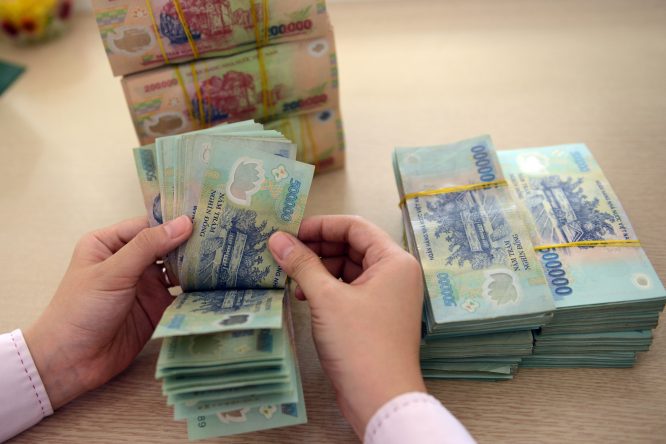The State Bank of Viet Nam’s reference exchange rate for the US dollar fell by 0.1 per cent at the end of 2020.

Viet Nam achieved a trade surplus of US$19.1 billion last year, the highest in five years, after exports rose by 6.5 per cent to $281.5 billion. — Photo tinhhoa.net
The State Bank of Viet Nam’s reference exchange rate for the US dollar fell by 0.1 per cent at the end of 2020.
Analysts expect the greenback to weaken further this year.
The US’s Federal Reserve plans to keep its rates near zero per cent until at least 2023 and allow a period of higher inflation, which is going to keep the dollar weak in 2021, according to VNDirect.
Meanwhile, the Chinese yuan is projected to stay strong since the world’s second-largest economy will continue to perform better than most others in 2021.
Similarly, the strong recovery by the Vietnamese economy amid the Covid-19 pandemic will be an important factor in boosting the dong.
Viet Nam achieved a trade surplus of US$19.1 billion last year, the highest in five years, after exports rose by 6.5 per cent to $281.5 billion.
Its inward remittances topped $15.7 billion, the ninth highest in the world.
As a result, the country’s foreign exchange reserves zoomed close to $100 billion by the end of 2020.
The stronger dong is also due to the recent accusation of Viet Nam as a currency manipulator by the US Department of the Treasury, which has made the central bank more wary of using monetary policy tools to regulate the exchange rate such as purchase of the greenback.
Benefits
What is the impact of the strengthening dong on the economy?
One evident outcome is the country’s exports will become less competitive, especially agricultural products, raw materials and unprocessed goods.
Obviously, imports will become cheaper. Another benefit is that servicing foreign debts will become easier both for the Government and enterprises.
The Power Generation Corporation No 3 (PGV) is a typical example. In 2020 it benefited to the tune of over VND1.2 trillion ($52.2 million) from the strengthening dong alone.
In past years it often suffered big losses when the currency weakened. In 2018, for instance, it lost VND2.6 trillion.
Many experts also believe that a stronger dong is likely to benefit the stock market.
They point to the fact that banks’ interest rate on dollar deposits has been zero since 2015. Yet, until last year, many people continued with the traditional Vietnamese habit of keeping their savings in dollars as a hedge against inflation, which once used to be rampant.
Once the love affair with the greenback ended, people began to switch to other asset classes like stocks and real estate.
The stock market is expected to attract more of this money thanks to its sharp gains in recent times and analysts’ predictions it will remain positive in the long term.
They pointed out that due to the fallout of the COVID-19 pandemic, most economies shrank in 2020 and, though it was one of the few countries to achieve positive growth, Viet Nam’s GDP only grew by 2.91 per cent, the lowest rate in over three decades.
The Government thus has to keep easing policies to pump prime the economy, which would positively affect investors’sentiments and the stock market, they said.
The Government’s persistent efforts to develop the capital market to lessen the dependence on bank credit have also come as a boost to the stock market.
The dong’s strength is helping attract foreign investment in the stock market since much of the exchange rate risk is mitigated.
The outcome of all this is being reflected in the numbers: In January alone, 86,269 new stock trading accounts were opened, up 36.4 per cent from the previous month.
This has been the theme of recent times. So many new investors have flocked to the market and trading has increased so much that the 20-year-old system used by the Ho Chi Minh Stock Exchange (HoSE) has been unable to cope with the load.
There has been several system failures, especially on days when the turnover crossed VND14 trillion.
To resolve the problem, HOSE and the State Securities Commission have proposed increasing the size of the standard lot from 100 to 1,000 shares and are encouraging small investors to switch to exchanged traded funds (ETFs).
ETFs track indexes, sectors, commodities, or other assets, but can be bought and sold on a stock exchange like a regular stock.
But industry insiders warned this could cause small investors to be eliminated from the stock market without fully addressing the overload problem.
Minister of Finance Dinh Tien Dung rejected HoSE’s suggestion to increase the lot size, but approved FPT chairman Truong Gia Binh’s proposal to allow private companies to participating into pilot settlment of clogged trading activities in four months.
The Vietnam Association of Financial Investors has called on the finance ministry to sack the HoSE bosses and replace them with experienced foreigners to resolve the overload problem.
It also suggested equitising the Vietnam Securities Depository and bringing in foreign stock exchanges as strategic shareholders of HoSE in charge of technology transfer and personnel training. — VNS





